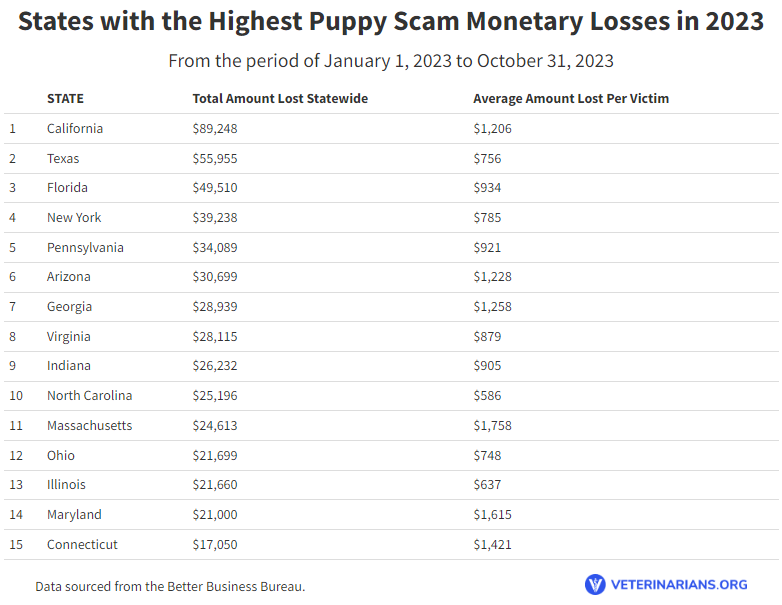Puppies for Sale: Beware of Online Puppy Scams

Table of Contents
The term ‘puppies for sale’ sees over 100,000 searches on Google every month. Searches traditionally spike every December, as families begin to search for the perfect Christmas puppy to add to their household.
The Special Reports Team at Onevet.ai, however, urges prospective families to be wary of online puppy scams, which have become increasingly prevalent in recent years. A puppy scam is a scam in which individuals seeking to adopt a puppy online unknowingly interact with fraudulent websites or Facebook/Craigslist listings that promise a puppy but never deliver the animal once the adoption fees are paid.
So far in 2023, Americans have lost over $1 million to puppy scams and have filed over a thousand puppy scam reports with the Better Business from the period of January 1, 2023 to October 31, 2023.
Below are the states that have seen the highest monetary losses to puppy scams during the analyzed time period, along with the average amount of money lost per victim in each state.

The Special Reports Team at Onevet.ai analyzed the 1,121 U.S.-based puppy scam reports filed with the Better Business Bureau from January 1, 2023 to October 31, 2023 to identify the states with the highest monetary losses during this time period.
The Top 15 states alone account for more than half of the over $1 million dollars lost nationwide to puppy scams.
California tops the list, with nearly $90,000 lost to puppy scams statewide during the analyzed time period. In this state, victims lost on average $1,206. Texas, Florida, New York, and Pennsylvania round out the Top 5, with victims in these states losing anywhere from $750-$900+ per scam.
These numbers, however, may very well be significantly higher. Among the over 1,000 puppy scam reports filed with the Better Business Bureau during the analyzed time period, 21% of victims elected not to disclose their state of residence but account for over a quarter of a million dollars in losses ($233,718).
How to Identify a Puppy Scam: 5 Warning Signs
There are common themes among the reports filed with the Better Business Bureau. These themes can help those who plan to use the internet to search for a new puppy avoid a potential scam.
What follows are the most common warning signs among puppy-related scams.
1. The seller claims that you will not be able to see the puppy in person before adoption and/or is unable to provide you with multiple pictures/videos of the puppy up for adoption. (Tip: Individuals can use Google’s image search tool to upload the picture of their chosen puppy and identify if the picture is actually coming from a stock photo site and/or appears on numerous other fraudulent websites, which can help in determining whether or not the puppy actually exists. Individuals can also request that the breeder take a picture with the puppy that includes a piece of paper in the frame with the individual’s name written on it and a specific date).
2. The seller asks for payment up front through Western Union, MoneyGram, a digital money app like Zelle or Cash App, or via a gift card. (Tip: While reputable breeders do normally require deposits for a spot on their waiting list, acceptable forms of payment for such deposits should include cash, check, credit card, and/or PayPal. Prospective adopters should always use a form of payment that provides protection in the event of a fraudulent charge.)
3. The seller or a third party asks for follow-up payments to cover additional items such as a climate-controlled crate for shipping, vaccinations, or transportation insurance/life insurance. In many cases, fraudulent emails will claim the shipping costs/crate rental fees will be refunded upon the puppy’s delivery. However, they never are. Such emails may also threaten individuals with criminal charges of animal abandonment/abuse if fees remain unpaid, a common fear tactic scammers employ to demand additional money.
4. The breeder’s website offers no information about the sire or dam (father/mother) of the litter, and/or the breeder is unable to provide proof of health records or AKC Certification.
5. In the case of purebred breeds, the puppy in question is being offered at a significantly steep discount when compared with the average price for a puppy of its breed.
Alternatives to Buying Puppies Online
Despite the ease of searching for a puppy through online marketplaces such as Craigslist and Facebook Market, as well as through independently-owned websites, these platforms are commonly referenced in reports filed with the Better Business Bureau. Those searching for an animal to adopt, therefore, should exercise extreme caution when utilizing such sites, keeping the aforementioned warning signs in mind at all times when interacting with sellers.
There are several alternatives to online platforms when it comes to searching for a new puppy, however. Local animal shelters and rescue groups often boast large numbers of animals that are waiting for a new home. Such organizations allow prospective adopters to interact with their animal of choice in-person to determine the animal’s compatibility with all members of the household. Adoption fees also tend to be significantly lower than what an individual might pay through an online breeder. Adopting from these organizations also helps reduce animal overpopulation in shelters, allowing more animals in need to be taken in and cared for.
For those interested in a purebred pet, it’s long been estimated that anywhere from 20-30% of the dogs in shelters are purebred. There are also numerous breed-specific rescue groups available across the nation. The AKC Rescue Network, for instance, consists of over 400 such groups. Additionally, individuals can search for breeder associations or clubs (e.g. Golden Retriever Club of America, Poodle Club of America, etc.) to find reputable breeders affiliated with the American Kennel Club.
Puppies for Sale: Final Thoughts
Online puppy scams will most likely continue to be an issue across the U.S.
However, individuals and families can protect themselves from scams by making themselves aware of the typical warning signs of a scam, and by adopting through an animal shelter, rescue group, or AKC-certified reputable breeder.
Raising awareness of such scams can also help to bring them to an end.















